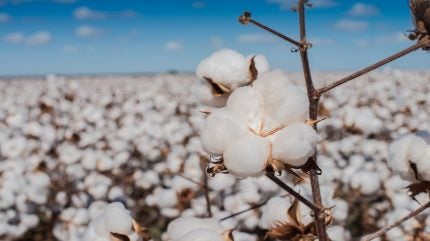
Turkmenistan’s government has been enacting reforms to tackle fundamental issues related to cotton forced labour and to bolster the autonomy of workers and farmers, as well as facilitate independent oversight and reporting.
However, a new report published by the Cotton Campaign’s partners, Turkmen.News and the Turkmen Initiative for Human Rights, which conducted independent civil society monitoring of Turkmenistan’s 2024 cotton harvest, suggests forced labour still exists.

Discover B2B Marketing That Performs
Combine business intelligence and editorial excellence to reach engaged professionals across 36 leading media platforms.
The report titled “Turkmenistan Cotton: State-Imposed Forced Labor In The 2024 Harvest And Links To Global Supply Chains“ claims coercive labour practices remain extensive and systematic despite early efforts to curtail forced labour, including refraining from drafting doctors and teachers in certain areas and raising picking rates to promote voluntary labour.
The report indicates continued mobilisation or extortion of public sector employees by authorities and institution leaders to participate in cotton picking or finance substitute labourers.
It also highlights governmental interference with International Labour Organization (ILO) monitoring activities during the harvest and retaliatory measures against Ruslan Myatiev, director of Turkmen.News.
Cotton Campaign coalition senior coordinator Raluca Dumitrescu said: “It is positive that the Turkmen government has taken some preliminary measures to reduce forced labour in the harvest, after a decade of sustained independent monitoring and reporting, advocacy, and campaigning by Turkmen NGOs operating from exile and international labour and business groups.

US Tariffs are shifting - will you react or anticipate?
Don’t let policy changes catch you off guard. Stay proactive with real-time data and expert analysis.
By GlobalData“However, dismantling the forced labour system requires not just changes to mobilisation of pickers, but also reforms that emphasise fundamental human and labour rights. The Turkmen government must stop punishing activists who speak out about abuses in the cotton sector and should take concrete steps to empower workers and farmers.”
While some regions did not witness the mobilisation or extortion of doctors and teachers during the 2024 harvest, a trend noted in the previous year’s harvest, the Turkmen government’s commitment to completely abolishing forced labour remains uncertain.
The state continued to compel or extort employees from various public institutions, including educational, healthcare, cultural, and utility organisations.
The government neither publicly denounced forced labour nor held accountable officials who engaged in such practices, according to the Cotton Campaign.
Furthermore, although ILO observers were permitted to monitor the harvest, authorities restricted their access to certain state employees and influenced others to deny any forced mobilisation.
Additionally, Myatiev faced retaliatory actions from the Turkmen government, which sought a travel ban against him through Türkiye.
“The government accepted engagement with the ILO to address forced labour in the harvest, which is important. But equally important, governments and international organisations, including the ILO, should not take success for granted. Instead, they should increase the pressure on the Turkmen government to make real progress in eliminating state-imposed forced labour,” Myatiev said.
The report claims that Türkiye is a significant processor of textiles derived from Turkmen cotton. Beyond Türkiye, brands and retailers may inadvertently source Turkmen cotton via suppliers in other nations, including Pakistan and European textile centres like Italy, Poland, or Portugal.
Forced labour in Turkmenistan’s cotton fields is said to be sustained by a hierarchical system where regional governors command state institutions to supply labourers for agriculture. Concurrently, the government stifles essential rights and liberties, impeding expression and association.
This oppressive environment renders any meaningful due diligence by brands and retailers unfeasible when attempting to prevent or address forced labour on specific farms.
Consequently, to adhere to existing and forthcoming laws prohibiting products made with forced labour — including a specific import ban on Turkmen cotton enacted by the US in 2018, the Cotton Campaign says companies must thoroughly trace their supply chains and exclude Turkmen cotton at all production stages.



